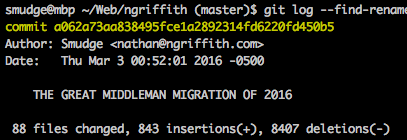If you're reading this post, it means I've successfully transitioned my blog—its styles, layout, and all of its posts—over to a new blogging engine. Farewell, Jekyll. Say hello to Middleman. Booyah.
Okay, so, not much has actually changed. Visually, nothing has changed, aside from a few minor housekeeping tweaks. I literally copy-pasted most of what you see. And, from a high level, the site is still served as a set of static, pre-generated files. The URLs are all the same. Even the CDN configuration is the same.
But after having a great time building the Middleman-powered developer blog at my office, I just couldn't resist dusting off my own website and giving it an internal makeover. (Make-under?) The resulting site, while outwardly identical to its predecessor, has a codebase that is leaps and bounds better—both easier to navigate and to extend. And that's why I'm so excited.
The Code
Git tells me that I've cut the site down by about 7,600 lines of code:

Crazy right? Well, to be fair, most of that code went totally unused—left over from numerous themes and plugins that I tested out and never bothered to remove. On its own, Jekyll is actually quite compact.
Shortly after launching this site in 2012, I designed my own theme and pared the plugins down to a small handful—such as one that caches tweet data so that embedded tweets don't disappear months or years later. Even with the plugins, the actual site was extremely tiny. The time I spent simplifying things made it quite easy to wipe everything away and build the site again from scratch.
Jekyll vs. Middleman
Would I recommend Middleman over Jekyll any day? Well, not necessarily, but only because they're both so similar.
There is definitely a strong case to be made for the way Middleman has extracted its blogging capabilities into a separate gem. It also keeps your public-facing files encapsulated in a "source" folder, which is nice. For some reason, Jekyll mixes public files with your private build files, requiring special configuration to prevent your site from leaking things you didn't intend. Yuck.
Of course, Jekyll is by far the most popular, especially when it comes to blogging, and has made numerous improvements since my use of it in 2012. So if you generally bet on the crowd favorite, Jekyll is the way to go. Yet, Middleman remains a strong contender and its flexibility might be more to your liking.